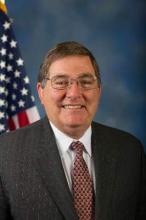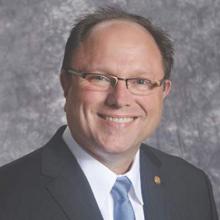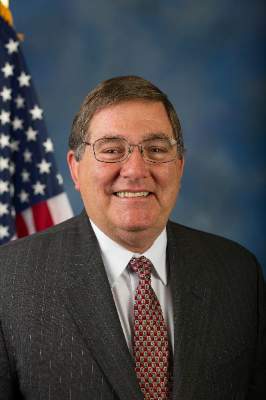User login
Physicians are lauding passage of legislation by the House of Representatives to repeal the Medicare Sustainable Growth Rate formula (SGR) and replace it with an alternative system that would raise physician payments and focus on value-based performance. The bill also reauthorizes the Children’s Health Insurance Program (CHIP) for 2 years.
By a vote of 329-37, the House on March 26 passed H.R. 2, the Medicare Access and CHIP Reauthorization Act. The legislation builds on H.R. 1470, the SGR Repeal and Medicare Provider Payment Modernization Act – reintroduced March 19 – which includes a 0.5% pay increase per year for providers over the next 5 years.
Physician leaders praised the vote and thanked lawmakers for finally passing what they called a critical SGR fix.
“Never before has there been such broad and bipartisan support within and outside of Congress for policies to repeal the Medicare SGR formula and to create a better payment system for physician services provided to patients enrolled in Medicare,” ACP President David A. Fleming said in a statement. “It is imperative that the Senate pass H.R. 2 before it recesses on Friday, March 27, and before a devastating 21% SGR cut is applied cut is applied to all physician services provided to Medicare enrollees.”
If enacted, H.R. 2 also would consolidate existing quality programs – including those regarding the meaningful use of electronic health records – into a single value-based performance program; incentivize physicians to use alternate payment models that focus on care coordination and preventive care; and push for more transparency of Medicare data for physicians, providers, and patients.
The bill also would reauthorize for 2 years CHIP, the Community Health Centers program, the National Health Service Corps, and the Teaching Health Centers program, all are scheduled to expire later this year. Additionally, the legislation continues a partial delay of the Medicare two-midnights ruleuntil Sept. 30.
The Congressional Budget Office estimates that enactment of H.R. 2 will increase the deficit by $141 billion over 10 years. The CBO’s score also found that the legislation would save money compared to the price of continued patches.
A total of $73 billion of the $214 billion cost of package is offset through spending reductions and revenue increases included in the bill, the CBO found. These include income-related premium adjustments for Medicare Parts B and D, Medigap reforms, an increase of levy authority on payments to Medicare providers with delinquent tax debt, adjustments to inpatient hospital payment rates, a delay of Medicaid Disproportionate Share Hospital (DSH) changes until 2018, and a 1% market basket update for postacute care providers
During House debate, Rep. Michael C. Burgess (R-Texas), the bill’s sponsor and a member of the Energy and Commerce Committee’s Health Subcommittee, said the legislation resolves an issue that many lawmakers have worked to repair their entire congressional careers.
“Everyone agrees, the Medicare Sustainable Growth Rate formula has got to go,” said Rep. Burgess, an ob.gyn. “The bill before us provides 5 years of payment transition and allows medicine to concentrate on moving to broad adoption of quality reporting and most importantly, allows congress to move past the distraction of the SGR formula and to begin to identify Medicare reforms that can further benefit our citizens.”
Physician associations commended passage of the bill.
“The American Medical Association applauds the U.S. House of Representatives for overwhelmingly passing a long overdue bill to permanently eliminate the flawed SGR formula and put in place important Medicare payment and delivery reforms that will improve the health of the nation,” AMA President Robert M. Wah said in a statement.
Long-term health security for elderly and disabled patients is closer to reality thanks to the passage of H.R. 2, according to Dr. Robert L. Wergin, president of the American Academy of Family Physicians.
“For the first time in 12 years, true Medicare reform is feasible,” Dr. Wergin said in a statement. “H.R. 2 repeals the disruptive SGR and restructures physician payment to help expand access, encourage quality improvements and spur innovation. The SGR has plagued Medicare patients for far too long. It’s destabilized their access to care and threatened the financial viability of their physicians’ practices for more than a decade.”
By reauthorizing CHIP, the bill will also help ensure millions of children, adolescents, and pregnant women have access to the care that they need, according to a joint statement by the American Academy of Pediatrics, the AMA, and the American Congress of Obstetricians and Gynecologists.
“CHIP is a bipartisan program that works,” the organizations said. “Since its beginning 17 years ago, the program has worked together with Medicaid to cut the child uninsurance rate in half, offering timely access to high-quality, affordable health insurance.”
Enactment of H.R. 2 will allow physicians to focus more fully on patient care rather than face the threat of dramatic cuts that could make caring for Medicare patients unsustainable, according to Dr. Kim Allan Williams Sr., president of the American College of Cardiology.
“Instead of kicking the can down the road one more time, Speaker [John] Boehner and Leader [Nancy] Pelosi demonstrated strong bipartisan leadership to address this problem at last. We urge the Senate to follow suit and quickly take up and pass the provisions of the House measure,” Dr. Williams said in a statement.
President Obama has indicated that he will sign the bill, calling the replacement model a system that offers predictability and accelerates participation in alternative payment models that encourage quality and efficiency.
“The proposal would advance the administration’s goal of moving the nation’s health care delivery system toward one that achieves better care, smarter spending, and healthier people through the expansion of new health care payment models, which could contribute to slowing long-term health care cost growth,” Mr. Obama said in a March 25 statement.
The bill’s passage comes as the latest SGR patch is set to expire on March 31.
The Senate could take up the bill as early as March 27; however, it also could wait until mid-April after a 2-week recess. Without a permanent or temporary SGR fix, doctors can expect a 21% Medicare pay cut come April 1.
Democrats on the Senate Finance Committee have criticized H.R. 2, saying that it unfairly penalizes patients and does not reauthorize CHIP for long enough.
“Any legislation of this magnitude sent to the Senate must be balanced,” according to a joint statement signed by all 12 Democrats who serve on the Finance Committee. “Our current understanding of what the House is negotiating does not sufficiently pass that test....While our concerns vary, we are united by the necessity of extending CHIP funding for 4 years.”
But Finance Committee Chair Sen. Orrin Hatch (R-Utah) has called for swift passage of the bill.
“The time to act is now,” Sen. Hatch said in a March 25 speech on the Senate floor. “I can’t imagine another bipartisan opportunity like this coming around again anytime soon.”
On Twitter @legal_med
Physicians are lauding passage of legislation by the House of Representatives to repeal the Medicare Sustainable Growth Rate formula (SGR) and replace it with an alternative system that would raise physician payments and focus on value-based performance. The bill also reauthorizes the Children’s Health Insurance Program (CHIP) for 2 years.
By a vote of 329-37, the House on March 26 passed H.R. 2, the Medicare Access and CHIP Reauthorization Act. The legislation builds on H.R. 1470, the SGR Repeal and Medicare Provider Payment Modernization Act – reintroduced March 19 – which includes a 0.5% pay increase per year for providers over the next 5 years.
Physician leaders praised the vote and thanked lawmakers for finally passing what they called a critical SGR fix.
“Never before has there been such broad and bipartisan support within and outside of Congress for policies to repeal the Medicare SGR formula and to create a better payment system for physician services provided to patients enrolled in Medicare,” ACP President David A. Fleming said in a statement. “It is imperative that the Senate pass H.R. 2 before it recesses on Friday, March 27, and before a devastating 21% SGR cut is applied cut is applied to all physician services provided to Medicare enrollees.”
If enacted, H.R. 2 also would consolidate existing quality programs – including those regarding the meaningful use of electronic health records – into a single value-based performance program; incentivize physicians to use alternate payment models that focus on care coordination and preventive care; and push for more transparency of Medicare data for physicians, providers, and patients.
The bill also would reauthorize for 2 years CHIP, the Community Health Centers program, the National Health Service Corps, and the Teaching Health Centers program, all are scheduled to expire later this year. Additionally, the legislation continues a partial delay of the Medicare two-midnights ruleuntil Sept. 30.
The Congressional Budget Office estimates that enactment of H.R. 2 will increase the deficit by $141 billion over 10 years. The CBO’s score also found that the legislation would save money compared to the price of continued patches.
A total of $73 billion of the $214 billion cost of package is offset through spending reductions and revenue increases included in the bill, the CBO found. These include income-related premium adjustments for Medicare Parts B and D, Medigap reforms, an increase of levy authority on payments to Medicare providers with delinquent tax debt, adjustments to inpatient hospital payment rates, a delay of Medicaid Disproportionate Share Hospital (DSH) changes until 2018, and a 1% market basket update for postacute care providers
During House debate, Rep. Michael C. Burgess (R-Texas), the bill’s sponsor and a member of the Energy and Commerce Committee’s Health Subcommittee, said the legislation resolves an issue that many lawmakers have worked to repair their entire congressional careers.
“Everyone agrees, the Medicare Sustainable Growth Rate formula has got to go,” said Rep. Burgess, an ob.gyn. “The bill before us provides 5 years of payment transition and allows medicine to concentrate on moving to broad adoption of quality reporting and most importantly, allows congress to move past the distraction of the SGR formula and to begin to identify Medicare reforms that can further benefit our citizens.”
Physician associations commended passage of the bill.
“The American Medical Association applauds the U.S. House of Representatives for overwhelmingly passing a long overdue bill to permanently eliminate the flawed SGR formula and put in place important Medicare payment and delivery reforms that will improve the health of the nation,” AMA President Robert M. Wah said in a statement.
Long-term health security for elderly and disabled patients is closer to reality thanks to the passage of H.R. 2, according to Dr. Robert L. Wergin, president of the American Academy of Family Physicians.
“For the first time in 12 years, true Medicare reform is feasible,” Dr. Wergin said in a statement. “H.R. 2 repeals the disruptive SGR and restructures physician payment to help expand access, encourage quality improvements and spur innovation. The SGR has plagued Medicare patients for far too long. It’s destabilized their access to care and threatened the financial viability of their physicians’ practices for more than a decade.”
By reauthorizing CHIP, the bill will also help ensure millions of children, adolescents, and pregnant women have access to the care that they need, according to a joint statement by the American Academy of Pediatrics, the AMA, and the American Congress of Obstetricians and Gynecologists.
“CHIP is a bipartisan program that works,” the organizations said. “Since its beginning 17 years ago, the program has worked together with Medicaid to cut the child uninsurance rate in half, offering timely access to high-quality, affordable health insurance.”
Enactment of H.R. 2 will allow physicians to focus more fully on patient care rather than face the threat of dramatic cuts that could make caring for Medicare patients unsustainable, according to Dr. Kim Allan Williams Sr., president of the American College of Cardiology.
“Instead of kicking the can down the road one more time, Speaker [John] Boehner and Leader [Nancy] Pelosi demonstrated strong bipartisan leadership to address this problem at last. We urge the Senate to follow suit and quickly take up and pass the provisions of the House measure,” Dr. Williams said in a statement.
President Obama has indicated that he will sign the bill, calling the replacement model a system that offers predictability and accelerates participation in alternative payment models that encourage quality and efficiency.
“The proposal would advance the administration’s goal of moving the nation’s health care delivery system toward one that achieves better care, smarter spending, and healthier people through the expansion of new health care payment models, which could contribute to slowing long-term health care cost growth,” Mr. Obama said in a March 25 statement.
The bill’s passage comes as the latest SGR patch is set to expire on March 31.
The Senate could take up the bill as early as March 27; however, it also could wait until mid-April after a 2-week recess. Without a permanent or temporary SGR fix, doctors can expect a 21% Medicare pay cut come April 1.
Democrats on the Senate Finance Committee have criticized H.R. 2, saying that it unfairly penalizes patients and does not reauthorize CHIP for long enough.
“Any legislation of this magnitude sent to the Senate must be balanced,” according to a joint statement signed by all 12 Democrats who serve on the Finance Committee. “Our current understanding of what the House is negotiating does not sufficiently pass that test....While our concerns vary, we are united by the necessity of extending CHIP funding for 4 years.”
But Finance Committee Chair Sen. Orrin Hatch (R-Utah) has called for swift passage of the bill.
“The time to act is now,” Sen. Hatch said in a March 25 speech on the Senate floor. “I can’t imagine another bipartisan opportunity like this coming around again anytime soon.”
On Twitter @legal_med
Physicians are lauding passage of legislation by the House of Representatives to repeal the Medicare Sustainable Growth Rate formula (SGR) and replace it with an alternative system that would raise physician payments and focus on value-based performance. The bill also reauthorizes the Children’s Health Insurance Program (CHIP) for 2 years.
By a vote of 329-37, the House on March 26 passed H.R. 2, the Medicare Access and CHIP Reauthorization Act. The legislation builds on H.R. 1470, the SGR Repeal and Medicare Provider Payment Modernization Act – reintroduced March 19 – which includes a 0.5% pay increase per year for providers over the next 5 years.
Physician leaders praised the vote and thanked lawmakers for finally passing what they called a critical SGR fix.
“Never before has there been such broad and bipartisan support within and outside of Congress for policies to repeal the Medicare SGR formula and to create a better payment system for physician services provided to patients enrolled in Medicare,” ACP President David A. Fleming said in a statement. “It is imperative that the Senate pass H.R. 2 before it recesses on Friday, March 27, and before a devastating 21% SGR cut is applied cut is applied to all physician services provided to Medicare enrollees.”
If enacted, H.R. 2 also would consolidate existing quality programs – including those regarding the meaningful use of electronic health records – into a single value-based performance program; incentivize physicians to use alternate payment models that focus on care coordination and preventive care; and push for more transparency of Medicare data for physicians, providers, and patients.
The bill also would reauthorize for 2 years CHIP, the Community Health Centers program, the National Health Service Corps, and the Teaching Health Centers program, all are scheduled to expire later this year. Additionally, the legislation continues a partial delay of the Medicare two-midnights ruleuntil Sept. 30.
The Congressional Budget Office estimates that enactment of H.R. 2 will increase the deficit by $141 billion over 10 years. The CBO’s score also found that the legislation would save money compared to the price of continued patches.
A total of $73 billion of the $214 billion cost of package is offset through spending reductions and revenue increases included in the bill, the CBO found. These include income-related premium adjustments for Medicare Parts B and D, Medigap reforms, an increase of levy authority on payments to Medicare providers with delinquent tax debt, adjustments to inpatient hospital payment rates, a delay of Medicaid Disproportionate Share Hospital (DSH) changes until 2018, and a 1% market basket update for postacute care providers
During House debate, Rep. Michael C. Burgess (R-Texas), the bill’s sponsor and a member of the Energy and Commerce Committee’s Health Subcommittee, said the legislation resolves an issue that many lawmakers have worked to repair their entire congressional careers.
“Everyone agrees, the Medicare Sustainable Growth Rate formula has got to go,” said Rep. Burgess, an ob.gyn. “The bill before us provides 5 years of payment transition and allows medicine to concentrate on moving to broad adoption of quality reporting and most importantly, allows congress to move past the distraction of the SGR formula and to begin to identify Medicare reforms that can further benefit our citizens.”
Physician associations commended passage of the bill.
“The American Medical Association applauds the U.S. House of Representatives for overwhelmingly passing a long overdue bill to permanently eliminate the flawed SGR formula and put in place important Medicare payment and delivery reforms that will improve the health of the nation,” AMA President Robert M. Wah said in a statement.
Long-term health security for elderly and disabled patients is closer to reality thanks to the passage of H.R. 2, according to Dr. Robert L. Wergin, president of the American Academy of Family Physicians.
“For the first time in 12 years, true Medicare reform is feasible,” Dr. Wergin said in a statement. “H.R. 2 repeals the disruptive SGR and restructures physician payment to help expand access, encourage quality improvements and spur innovation. The SGR has plagued Medicare patients for far too long. It’s destabilized their access to care and threatened the financial viability of their physicians’ practices for more than a decade.”
By reauthorizing CHIP, the bill will also help ensure millions of children, adolescents, and pregnant women have access to the care that they need, according to a joint statement by the American Academy of Pediatrics, the AMA, and the American Congress of Obstetricians and Gynecologists.
“CHIP is a bipartisan program that works,” the organizations said. “Since its beginning 17 years ago, the program has worked together with Medicaid to cut the child uninsurance rate in half, offering timely access to high-quality, affordable health insurance.”
Enactment of H.R. 2 will allow physicians to focus more fully on patient care rather than face the threat of dramatic cuts that could make caring for Medicare patients unsustainable, according to Dr. Kim Allan Williams Sr., president of the American College of Cardiology.
“Instead of kicking the can down the road one more time, Speaker [John] Boehner and Leader [Nancy] Pelosi demonstrated strong bipartisan leadership to address this problem at last. We urge the Senate to follow suit and quickly take up and pass the provisions of the House measure,” Dr. Williams said in a statement.
President Obama has indicated that he will sign the bill, calling the replacement model a system that offers predictability and accelerates participation in alternative payment models that encourage quality and efficiency.
“The proposal would advance the administration’s goal of moving the nation’s health care delivery system toward one that achieves better care, smarter spending, and healthier people through the expansion of new health care payment models, which could contribute to slowing long-term health care cost growth,” Mr. Obama said in a March 25 statement.
The bill’s passage comes as the latest SGR patch is set to expire on March 31.
The Senate could take up the bill as early as March 27; however, it also could wait until mid-April after a 2-week recess. Without a permanent or temporary SGR fix, doctors can expect a 21% Medicare pay cut come April 1.
Democrats on the Senate Finance Committee have criticized H.R. 2, saying that it unfairly penalizes patients and does not reauthorize CHIP for long enough.
“Any legislation of this magnitude sent to the Senate must be balanced,” according to a joint statement signed by all 12 Democrats who serve on the Finance Committee. “Our current understanding of what the House is negotiating does not sufficiently pass that test....While our concerns vary, we are united by the necessity of extending CHIP funding for 4 years.”
But Finance Committee Chair Sen. Orrin Hatch (R-Utah) has called for swift passage of the bill.
“The time to act is now,” Sen. Hatch said in a March 25 speech on the Senate floor. “I can’t imagine another bipartisan opportunity like this coming around again anytime soon.”
On Twitter @legal_med




